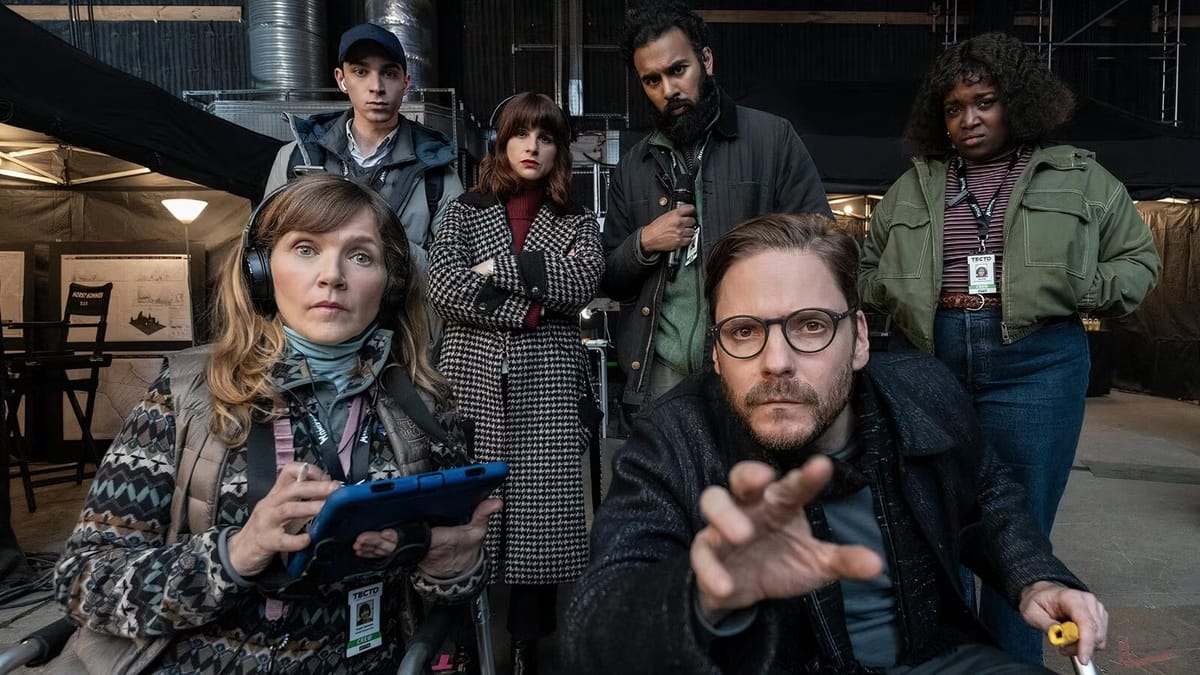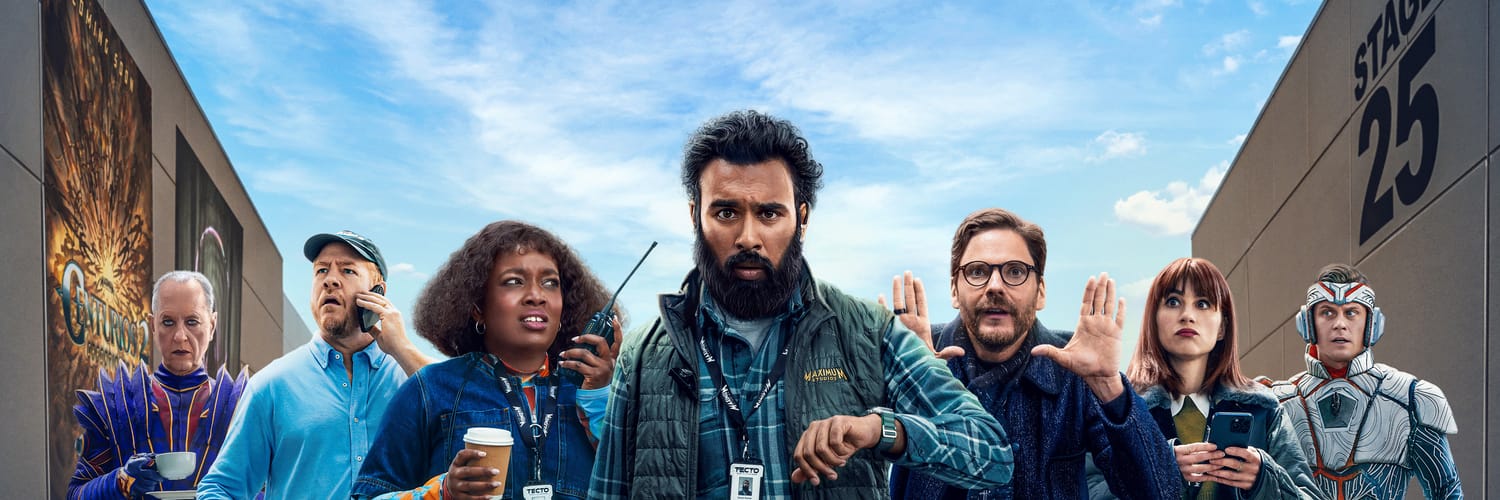"The Franchise" Has A Generous Kind of Mirth

The corporation is enraged that the raw materials it is their charter to exploit have found voice and "answered back." The audience, to them, is composd of ignorant natives, who must be transformed, segment by segment, into docile proprietary consumers...not only proprietary but addicted. The Britsih opium trade, say, or, in its modern iteration, the "franchise" movie. "But, but," the artist interjects, and is threatened with poverty.
David Mamet, "BAMBI V. GODZILLA; Why art loses in Hollywood (Harper's Magazine, June 2005)
“We don’t have an opinion, O.K? We just keep the trains running. Who cares what’s on them?”
Himesh Patel’s Daniel to Lolly Adefope’s Dag regarding the “invisible jackhammer” scene of “The Franchise”:
It’s become only too easy, in recent years, to put the boot into the undead body of superhero movies. And if David Mamet went from legendary playwright (hey, “Glengarry Glen Ross” can stand proud as cinema as long as it likes) to curmudgeon, the hand-wringing he epitomizes above is not new. The genre haven’t bled out yet--though between “The Joker: Folie a Deux" , of which we could say Todd Phillips could surely do much better, and “Venom”--where have you gone, Tom Hardy?--it’s not looking like the supervillains who will revivify the tortured genre.
The makers of Max’s recently-concluded eight-episode comedy “The Franchise” bring a great satirical pedigree to considering the problem. The inciting notion for the series arose out of by a chance conversation in which Sam Mendes casually described to satirical wizard Armando Iannucci the exigencies of scale Mendes faced making two Bond films (“Skyfall” in 2013 and “Spectre” in 2015). "That’s a comedy,” observed Iannucci, and the very next day Mendes called seconding the concept of a plan.
Scotsman Iannucci, of course, is one of two twin summits of British-birthed streaming shows. His “In the Loop” (2009), “The Thick of It” (2005-2012) and “Veep” ( 2012-2105) set a standard for face-slapping comedy equaled only by the works of Jesse Armstrong, who worked on all three of those shows before going on to mastermind the epochal “Succession.”
If Iannucci’s gift is for crackling comedic spew is unique, and Armstorng’s operative mode is darker (as epitomized by his irascible billionaire Logan Roy’s depiction of life as “a fight for a knife in the mud”), both as show runners had elite writing rooms, and both found room in theirs for the worthy they would enlist as showrunner for “The Franchise,” fellow Brit Jon Brown.
As seen in various promo chats for the series, Brown self-presents as the quiet guy in the corner, humble and distracted, tugging strands of hair. But like his fellow writer-producers, he can bring forth our laughter by deploying his characters with a sarcasm that often uses edged weapons. Clearly raised amid addictive video games (and possessed of a super-nerd likeability that nonetheless seems to speak of a wish to get back to the thumbing buttons to kill some zombies), he came out of writing for gaming mags to launch two well-liked series rooted in that world.
His snickering 2017 comedy “Loaded” (an upgrade from his launch into the biz with “Avatards”) showed us four longtime friends shuddering through the sudden-wealth impact of a giant buyout of their smash hit, phone-friendly game called “Cat Factory.” They all know it’s silly--they’re only steps away from their mom’s cellar, living as a suddenloy rich quartet in start-up-style bro-quarters. They want only some vengeance on the previous doubters—and well, a starter Ferrari. (Though one gifts his parents a pricey world tour that features Yemen, Uganda and Bolivia only to find they like...Florida.) Brown next teamed with Armstrong on 2019’s British Channel 4 sitcom “Dead Pixels,” which the Guardian found “gut-bustingly funny”, It also onboarded Brown’s secret weapon, what the NME called “real pathos,” as it unveiled “the chasm at the core of Brexit Britain." (Both can be found online, for any Brit Box folkies fully sated with say, inspectors solving murders in Oxford.)
True to the life challenges of many a gamer, but carried through to this day in slightly pained fashion in Brown’s work, his males tend to show a certain ineptitude with the opposite sex. I almost said “oppositional,” because, although the writing is wised-up enough to show the women evolved beyond the men, there’s usually relationship pains near at hand. It’s all made funny, not to say deliciously ridiculous, by the production’s attempts to solve the franchise’s “woman problem”—like so much in the series, a riff on actual Marvel and DC quandaries of not-so-recent times. ( In interviews Brown has nodded to the notion that the slam-bang epics he mocks may still have a role in "saving cinema...keeping the multiplexes open". And for some the box office for the nothing-matters-and what if-it-did? farragos of the "Deadpool" er, franchise gives the MCU and its like some breathing room as self-aware.)
In “The Franchise” the womanly power of daunting attractiveness resides with Aya Cash as Anita, the hyper-ambitious line producer—and former lover of Patel’s Daniel. Cash is memorably the hate-boinking girlfriend of evil supervillain Homelander in “The Boys,” in her guise as the white supremacist Stormfront (think Kimberly Guilfoyle with a dose of Proud Boys tiki-torch fuel in her ) iand her Anita is uneasily the studio’s designated whip hand on the set of “Tecto: Eye of the Storm,”--a control freak to the below-the-line functionaries, but a justifiably paranoid subaltern to the studio chiefs, and especially franchise overseer Pat (Darren Goldstein, so convincingly corrupt as a businessman thirsting for Laura Linney in “Ozark”).
One hopes Max will be wise enough to renew the show for a second season, so we can get more of its array of terrific comic performances from Richard Grant, the above-cited Adefope, and the rest of the pack pictured above and below.
Patel’s Daniel is our hero, and gradually becomes his own, in a steady, stalking parade here and there on the wonderfully absurd sets, often screeching in worry over the mangled workmanship all around. But don’t sleep on Daniel Bruhl as rising (or is it descending from) indie credentialed German auteur. He spits out cherishable dialog: I’m a weird, difficult guy. I look like this hipster chinos man who goes to Muji to buy a towel, but I’m not. I’m strange and I’m serious. I don’t know how to think like the kind of guy who washes his car, eats a chicken drumstick with his wife, and then has a bath,” he says. “If that’s what they want, hire Ron Howard.”
That line made me laugh…out…loud (remember when those were words?), as I had spoken with him on the English racetrack set of “Rush,” as directed by…yeah. (My set interview with Ron Howard for American Cinematographer ran in the October 2013 issue.)
“Rush” screenwriter Peter Morgan told me of Bruhl, “He’s complex enough as a human being to be able to do justice to the most complex parts,” and his Eric is one of the best neurasthenic Teutonic impressions I’ve seen since SNL’s “Sprockets” sketches.
A word needs to be said regarding the widely held belief that the boisterous hambone Philistine that Goldstein so watchably plays in the series is congruent with longtime Marvel impresario and hands-on producer Kevin Feige. Asked about the resemblance by The Hollywood Reporter, Brown lightly demurred: “Everyone we spoke to said, ‘Kevin Feige is an incredibly nice man,’” Brown says. “So straight away as a writer, you’re like, ‘Fuck, that’s such a shame — be a real monster and we could go after him.’”
Reporting on Marvel’s rise over the years, I can confirm that. I recall finding myself in his office production trailer on a muddy backroads site outside Vancouver on “Fantastic Four,” circa 2004. Our meet was brief--next up was a chat with Jessica Alba so why linger with him?—I found a welcoming and thoroughly informative advocate for the film, though he had to be somewhat aware that the effort would emerge as what the AV Club reviewer called “a garish mediocrity.” (And perhaps also foreseeing that this iteration of the foursome’s saga would find box office global that tripled its $100 million cost.)
I can recall sets where the fillmakers had still less call for optimism—Karyn Kusuma’s “Aeon Flux” and Wolfgang Peterson’s “Speed II” come to mind—but also visits where I saw adversity and challenges being overcome to great effect—Spielberg on “Jurasssic Park,” Demme on “Silence of the Lambs,” Michael Mann on “Last of the Mohicans,” Fincher on “Zodiac.” And yes, Kevin Costner on “Dances with Wolves.”
Okay, those are classics and quite aside from the oddball rigors of superhero fare. But a point the makers of “The Franchise” routinely emphasize is they too are fans—betwen Mendes, Brown and Iannucci they cited “Thor: Ragnarok,” “Captain America: Winter Soldier,” the first “Iron Man,” “The Dark Knight” and the Sam Raimi/Tobey Maguire “Spiderman II.”
The names of the “Tecto” gang’s presumed filmmaking betters drop in Brown’s scripts like mocking incendiary rounds on the hapless crew and cast—Sofia Coppola, Bong Joon-Ho, and most especially, Chris Nolan, who—via a stand-in actor seen from a distance—actually visits the shoot and befriends a “Tecto” crew member who’d been shunted to the sidelines for most of the shoot we witness.
It's an emblematic moment for the actual generosity of Brown’s imaginings, as the story and atmosphere shows his loyalty to the below-the-line folk. If the magic of the superhero branding hit what Brown calls the genre’s “”tricky patch” reduced too often to a mismanaged, audience-pandering pursuit as various efforts stumble towards. climaxing in “the flight over the glowy thing,” Brown feels their pain and that lends his work a ready, affirmative humanity: “It’s human being sstruggling with something they care about.”



Comments ()